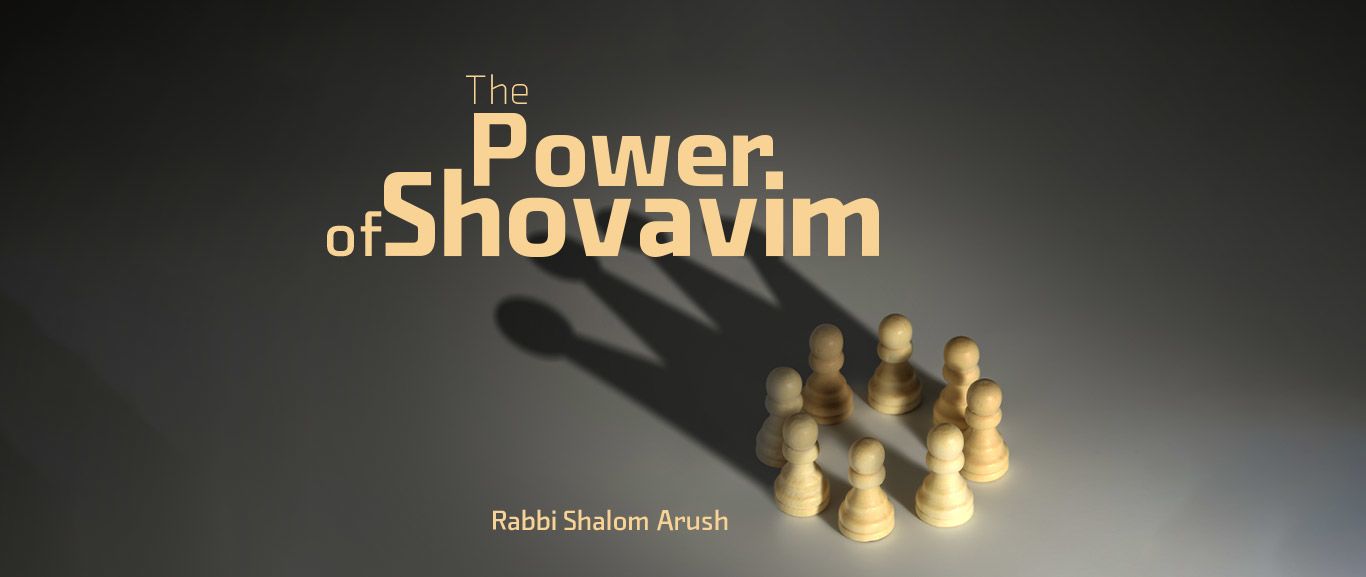
The Power of Shovevim
The six weeks of Shovevim is conducive to grow our personal holiness. What do we need to focus on during the weeks of Shovevim?

This week begins the period of “Shovevim”, the 6-week period named as an acronym for the six Torah portions from the week of Shemot to and including the week of Mishpatim (Shemot, Va’eira, Bo, Beshalach, Yitro, Mishpatim). The Shovevim period is a most conducive time for enhancing personal holiness.
All the advice about maintaining personal holiness and guarding our eyes seems simple and straightforward. Rebbe Nachman says that when we sanctify ourselves, we merit Divine abundance. It sounds so easy! Yet, as soon as a person makes the slightest effort in the area of refinement, especially in the area of personal holiness and guarding his eyes, he sees just how difficult it is and how far he is from any semblance of holiness. In fact, splitting the Red Sea would be easier.
So how does one sanctify himself, without falling into despair and disappointment from all the setbacks he experiences every single day?
Every Mishna in Tractate Avot and every halacha (law) in Shulchan Aruch (the Code of Jewish Law)  brings us closer to Hashem, but how do we implement them in our daily lives?
brings us closer to Hashem, but how do we implement them in our daily lives?
Our sages in Tractate Avot tell us, “Look at three things, and you won’t transgress: know what is above you, the eye sees and the ear hears, and all your deeds are written in a book.” One who does so will attain a holy spirit. And, if one only fulfills the first halacha in the Shulchan Aruch, especially what the Rama writes, he’ll surely ascend the path of righteousness: “‘I place Hashem before me always” is a golden rule in Torah and in the ways of the tzaddikim that walk before Hashem, for a person’s actions in the privacy of his own home do not resemble his actions in the presence of a great king.” Every halacha is wonderful advice in getting close to Hashem.
But once again, how do we implement each priceless morsel of advice? The only way is to pray for it. Maybe we sound redundant, but people have difficulty internalizing that there is no solution but to turn to Hashem and solicit His help in anything we want and need to accomplish, especially spiritual endeavors where the evil inclination places so many obstacles in our way. And, since the evil inclination doesn’t want us to pray, it will enlist the whole world to mock a person for wanting to talk to Hashem. No wonder Rebbe Nachman tells us that personal prayer is the greatest virtue that surpasses everything. Let’s see why:
Nothing is as conducive to changing a person for the better as personal prayer. Even if a person has extensive knowledge, he isn’t always able to implement what he knows and live by it. But by praying to implement what he has learned, a person more deeply internalizes what his brain knows. Once the knowledge has penetrated the heart, a person can “wholeheartedly” live by it. Nothing is as effective as personal prayer to internalize a concept.
Here’s an example: suppose a person learns the principles of emuna. Once the brain is aware of emuna, his heart will absorb it to an extent. The person may begin to look at the world through eyes of emuna, but he’ll still lack the inner tranquility in the face of hardship that deep-seated emuna will give him. The knowledge of one’s brain changes a person only when it filters down to his heart, otherwise it remains theoretical. Moreover, knowing the right thing to do but not doing it because of a lack of belief or lack of internalization is not exactly praiseworthy.
Daily personal prayer has the power to drive what the brain knows deep into the heart and thereby change a person. For example, anyone who learns the “Garden of Peace” knows that it’s wrong to criticize his wife. But if he doesn’t ask Hashem for help in daily personal prayer, he’ll invariably slip up and continue to criticize her. He must therefore ask, “Hashem, help me implement what I’ve learned. This is often difficult for me, for my evil inclination fights me tooth and nail. Please have mercy on me and come to my aid.” There is nothing loftier than such personal prayer.
Sexual lust is the evil inclination’s most cogent weapon, which virtually drives people insane. Perhaps a person is capable of overcoming one of the evil inclination’s less-lethal weapons of temptation without asking Hashem for help, but when it comes to personal holiness and guarding one’s eyes, one comes into direct confrontation with the evil inclination and his most cogent weapon. Extensive personal prayer is one’s only chance of prevailing.







